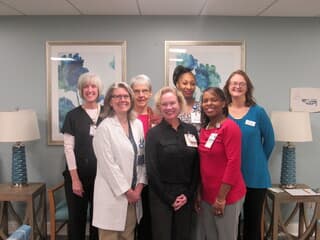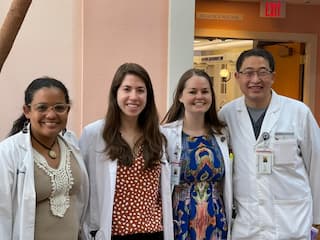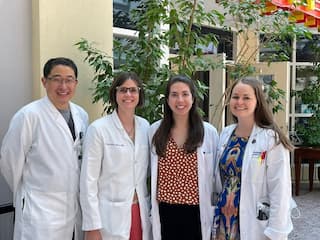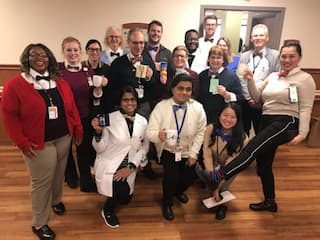
Training locations at Duke are all within a few miles of the Medical Center campus, and the VA Medical Center is a quick walk across the street. Click here for a searchable Google map of locations
Learn more about our available experiences and training sites:
Geriatrics Inpatient Consultation
Rotation Director: Dr. Neema Sharda
This rotation is based at Duke University Hospital. Fellows see patients on medicine and surgery services and learn about a variety of core issues, including delirium, perioperative care, goals of care, and management of transitions. The fellow works closely with the Geriatric Consult attendings to provide care for geriatric medicine inpatient consults. The fellow is responsible for leading the team, which includes trainees from internal and family medicine, as well as medical students.
Croasdaile Village
Rotation Directors: Dr. Heidi White and Dr. Neema Sharda

Croasdaile Village is a continuing care retirement community located 2.5 miles from Duke University Medical Center. Independent living, two levels of assisted living and skilled nursing care are available to more than 500 residents. Medical facilities include an outpatient clinic staffed with three nurse practitioners operating five days a week and an Alzheimer’s disease special care unit.
Fellows follow patients in the skilled nursing facility (Croasdaile Pavilion) throughout their fellowship. This population includes a mix of long-term care residents and patients receiving acute rehabilitation after a hospital stay. Fellows round weekly with faculty members and occasionally with other trainees.
In addition to weekly rounds, fellows work alongside the facility’s nurse practitioners, social workers, and therapists to learn all facets of nursing home medicine. For fellows interested in post-acute and long-term care medicine, opportunities for research and quality improvement are available.
The Forest at Duke
Rotation Directors: Dr. Gwendolyn Buhr and Dr. Milta Little


The Forest at Duke is a continuing care retirement community located10 minutes from Duke’s West campus and is home to almost 300 older adults. Independent living, two levels of assisted living and skilled nursing care are available to residents based on their individual needs. Medical facilities include an outpatient clinic operating five days a week and an Alzheimer’s disease special care unit.
Fellows follow a cohort of patients in the skilled nursing facility throughout their fellowship. These include a mix of long-term care residents and patients receiving acute rehabilitation after a hospital stay. Fellows round weekly with faculty members and occasionally other trainees.
Durham VA Medical Center Community Living Center (CLC)
Rotation Director: Dr. Katja Elbert-Avila

The Durham VA CLC is a skilled nursing and long-term care facility located with the Durham VA Health Care System which provides care for veterans admitted for long term care or short stay services such as rehabilitation, respite, hospice, or skilled nursing treatments such as wound care. Fellows spend 2 weeks in the CLC learning about nursing home interdisciplinary teamwork, including Quality Assurance and Performance Improvement Programs.
Models of care allows fellows opportunities to observe and participate in care delivery models for older adults. Examples of clinical experiences include:
- Home-based primary care and transitional care
- COACH Program at the VA Medical Center - caring for the veterans and their caregivers in their home setting to prevent institutionalization
- Subspecialty clinics, such as neurology movement disorder and metabolic bone disease clinics
Senior Community Care of North Carolina is a comprehensive health care program for seniors living in select counties in Wake, Durham, and Granville counties and is a Program of All-Inclusive Care for the Elderly, also called PACE. Fellows will get to work with the medical director and inter-professional providers to learn about this model of care.
Fellows rotate through a variety of clinical settings with the palliative care team. They work on the inpatient consult service at the VA Medical Center and rotate in the Duke Homecare and Hospice inpatient hospice unit. During this rotation, fellows receive education on topics important to palliative care, such as symptom management, opioid conversion, adjunctive pain treatments, and end-of-life care. Additionally, fellows will participate in and lead goals of care meetings.
Rotation Director: Dr. Shelley McDonald
POSH is a VA based rotation where a team-based approach in which surgeons, geriatricians, anesthesiologists, nutritionists, therapists, and patients work together to head off potential problems before surgery. Older adults are at risk for complications because they are more likely to have more than one medical condition, multiple prescriptions, and decreased strength, vision, hearing, and/or cognition. The POSH team follows the patients before and after surgery at the VA Medical Center.
Rotation Director: Dr. Mamata Yanamadala
Fellows will have 3 one-week rotations for electives. The rotation director with meet with the fellows at the beginning of the year to identify individual interests and career focus. The elective experiences will be matched with fellows’ interests. The experiences could range from inpatient, outpatient, research, QI and subspeciality areas (driving evaluation, sleep clinic, ECT, low vision, urogynecology, urology, neuropsychology).
“During my academic rotation, I had the opportunity to work with some of the Duke first year medical students on the Music and Memory Project at Eno Pointe Assisted Living Facility in Durham. It was a privilege to see the effect that personalized music had on residents at the facility.”
Charles “Cole” Sims, MD, Fellowship Alumni
Geriatric Medicine Fellows’ Clinic at the Durham VA Medical Center
Rotation Director: Dr. Laura Previll
Fellows provide primary care and consultative services to elderly veterans, most of whom are octogenarians and have chronic medical problems, such as diabetes, heart disease, arthritis, and dementia. Fellows follow a panel of veterans with scheduled office hours one half-day per week.
The DVAMC is a modern, well-equipped hospital with readily accessible array of diagnostic services, allied providers and subspecialists. The on-site interdisciplinary team includes a clinical social worker, a geriatric nurse practitioner, a clinical pharmacist, a registered nurse, a dietitian, and an attending geriatrician. Fellows work alongside inter-professional learners including nurse practitioner, pharmacy, physical therapy, occupational therapy.
Rotation Director: Dr. Collin Burks and Dr. Julianna Marwell
The clinics rotation provides options for exposure to numerous geriatric focused subspecialty clinics at Duke and the Durham VA Medical Center.
The Duke Geriatric Evaluation and Treatment (GET) Clinic:
- The Duke GET Clinic was one of the nation’s first outpatient geriatric assessment clinics. It provides multidisciplinary assessment of elderly women and men by geriatricians, geriatric psychiatrists, social work and geriatric nursing. Patients are referred locally, regionally and nationally by healthcare professionals and families for evaluation of multiple geriatric problems including polypharmacy, falls, dementia, and others.
Memory Disorders Clinic:
- Duke’s Memory Disorder’s Clinic provides diagnostic expertise, cutting-edge treatment and research for memory and movement problems. Fellows see patients with a variety of memory disorders, including Alzheimer’s disease and other neurocognitive disorders.